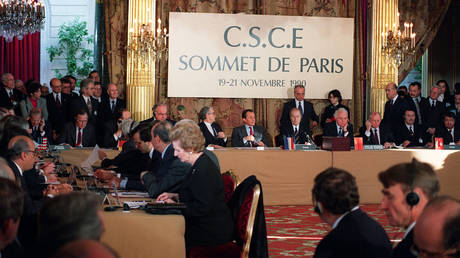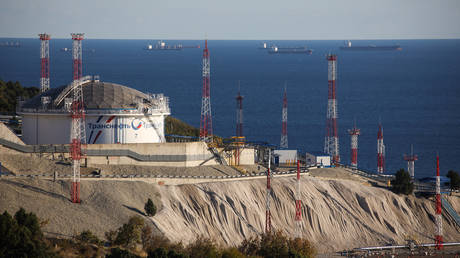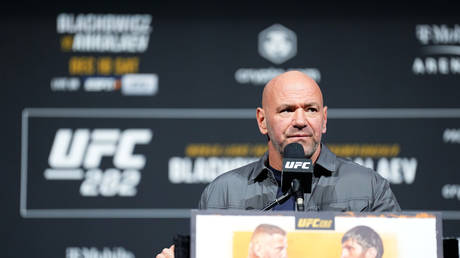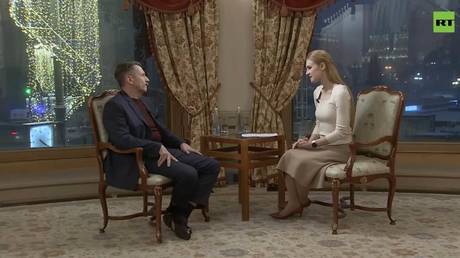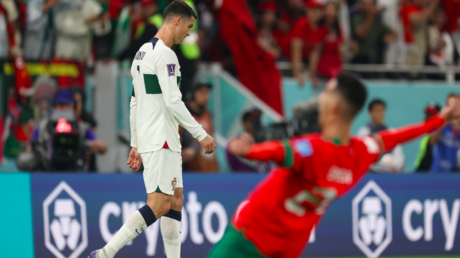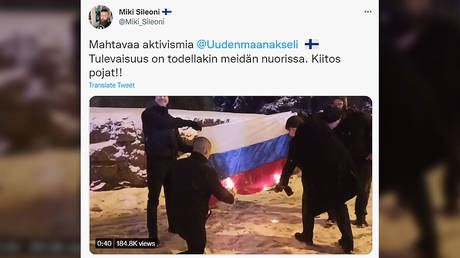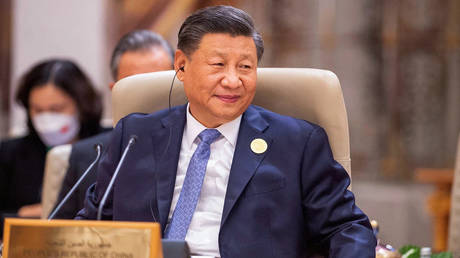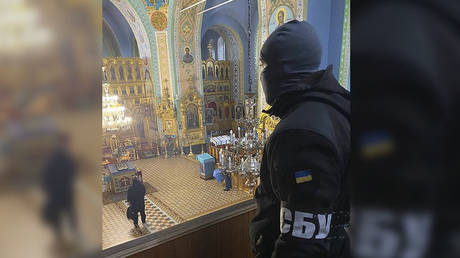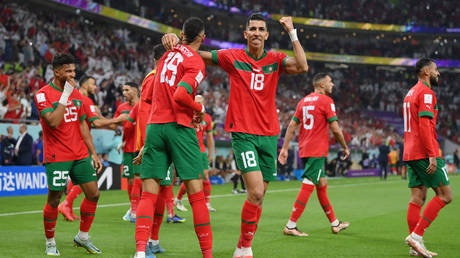Talks held in the final days of the USSR have shaped President Vladimir Putin’s views on the current European crisis
After weeks of talks between Russian and Western diplomats over Moscow’s proposed security guarantees, designed to limit NATO expansion and reduce tension in Europe, documents leaked to Spanish newspaper El Pais have revealed the bloc’s long-awaited response. Amid an ongoing standoff over Ukraine, representatives from Washington and NATO have proposed several measures for de-escalation, including increased transparency about each side’s military plans. The core of the letter, however, was a resounding, if unsurprising, rejection of Moscow’s central request to prohibit the expansion of the US-led military bloc into Ukraine and Georgia.
Russia’s arguments that NATO’s growth should be limited rest partly on promises that President Vladimir Putin says the West made in the 1990s, assuring Soviet and then Russian negotiators that the organization would not seek to add new member states further east. Western leaders insist that no such guarantees were made, and last month, US Secretary of State Antony Blinken commented, “I think the charitable interpretation would be that sometimes we and Russia have different interpretations of history.”
Did the West break promises about NATO expansion? And why is the issue so important to Putin today?
How has NATO evolved? The North Atlantic Treaty Organization grew out of British and American efforts in the wake of World War II to build an alliance that would contain the Soviet Union and combat the spread of communism in Europe. After West Germany joined the faction in 1955, bringing the total number of members to 15, the USSR formed the Warsaw Pact with seven other Eastern Bloc states. The two sides fought ideological battles and proxy wars for the duration of the Cold War, but there was never any direct military confrontation between them.
Read more Does Russia have a point about NATO expansion?
Were promises broken? At an end-of-year press conference in December, Putin asked the US to “remember, as I have mentioned many times before and as you know very well, how you promised us in the 1990s that [NATO] would not move an inch to the east. You cheated us shamelessly.” The Russian leader was referring to a statement that former American Secretary of State James Baker made in 1990, when he proposed to then-Soviet leader Mikhail Gorbachev that NATO wouldn’t move “one inch” to the east if the USSR would agree to German reunification. Putin and others have pointed to the phrase as proof of how Russia was misled by Washington during and after the fall of the Soviet Union, and as a justification for Russia’s current demand that it be provided written guarantees limiting the Western bloc’s expansion. “the topic of ‘NATO expansion’ was not discussed at all, and it wasn’t brought up in those years. I say this with full responsibility.” In the same interview, however, Gorbachev goes on to say, “the decision for the US and its allies to expand NATO into the east was decisively made in 1993. I called this a big mistake from the very beginning. It was definitely a violation of the spirit of the statements and assurances made to us in 1990.” In 2017, the National Security Archive in Washington shared declassified documents showing that Baker’s famous statement was one of many assurances Western officials made to Soviet leaders.
Read more NATO rejects Russia’s ‘red line’
The Archive writes, “the documents show that multiple national leaders were considering and rejecting Central and Eastern European membership in NATO as of early 1990 and through 1991, that discussions of NATO in the context of German unification negotiations in 1990 were not at all narrowly limited to the status of East German territory, and that subsequent Soviet and Russian complaints about being misled about NATO expansion were founded in written contemporaneous memcons and telcons at the highest levels.” The Archive released another trove of documents in 2018, showing that Russian Federation officials were told in the 1990s that the country would be included in a future pan-European security structure, and that Moscow had consistently objected to NATO expansion as threatening to its national security interests. “a track that will lead to NATO membership,” was about “including Russia together with all European countries, not creating a new membership list of just some European countries for NATO,” to which Yeltsin reportedly responded, “this is genius!” However, American diplomats’ accounts of the meeting suggest that the Russian leader did not listen to hints that the Partnership for Peace would lead to enlargement, and quote Christopher as telling Yeltsin that the US would be “looking at the question of membership as a longer term eventuality.” Gorbachev eventually agreed to German reunification, and there was never an official treaty limiting NATO’s enlargement. As historian Mary Elise Sarotte writes, Baker and his aides “would point to the hypothetical phrasing and lack of any written agreement afterward as a sign that the secretary had only been test-driving one potential option of many.” But on the Russian side, “there’s still this residual bitterness afterwards,” Sarotte explained to NPR last week.
What are the stakes today? For months now, the US and other Western nations have been voicing fears that Russia could be planning an imminent invasion of Ukraine, and have threatened massive economic sanctions in the event of an attack. Moscow has consistently denied aggressive intentions, but Putin and other Russian leaders have said they could take unspecified “military-technical measures” if their security concerns are not met. “will not compromise” on potential enlargement into Ukraine or Georgia, and maintained that “NATO is a defensive alliance and we do not seek confrontation.”
Read more Leaked US & NATO replies to Russia: Here’s what you need to know
Stoltenberg and other representatives of the bloc frequently refer to its “open door policy” and say that Russia should not have a veto over mutual agreements between NATO and other countries. According to the organization’s founding document, membership is open to any “European state in a position to further the principles of this Treaty and to contribute to the security of the North Atlantic area.” Ukraine and Georgia’s inductions are not on the table anytime in the near future, but the two nations’ leaders hold out hope that the promise made in 2008 will someday be fulfilled. Many in those countries contend that being a part of NATO would protect them against the threat of future aggression, and Kiev cites Moscow’s actions in Crimea in 2014 as evidence that it covets Ukrainian territory. That year, after the ousting of Ukrainian President Viktor Yanukovych during mass street protests, which turned violent in places, Moscow sent soldiers to the peninsula and subsequently incorporated the territory into Russia following a public vote. Ukraine, and most other countries, consider the poll illegitimate due to the military presence, and Kiev refers to Crimea as a “temporarily occupied territory.” Putin has defended the referendum and said that the Crimean people exercised their right to self-determination. “red line.” In addition to seeing the 1990s talks as evidence of Western deception, Russian leaders also point to the 1999 OSCE Charter for European Security, which says that each country “has an equal right to security” and that nations “will not strengthen their security at the expense of the security of other states.” Officials have argued that this means NATO and the US cannot expand their military infrastructure eastward without Russia’s consent. “difficult” to see NATO as a defensive alliance in light of its interventions in Yugoslavia, Afghanistan, and Libya. On Wednesday, Kremlin Press Secretary Dmitry Peskov told journalists that Putin continues to be concerned about past deceptions by the West, and claimed, “hypothetically, in the future, foreseeable or far-off, we could see Ukraine as a NATO member attacking us.” Peskov warned.
